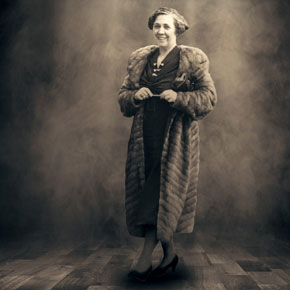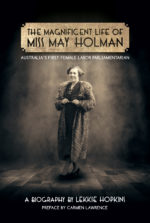New history celebrates forgotten female politician

Throughout the 1930s May Holman was a household name and an inspiration to the women of her generation. She made history in 1925 when, at age thirty-one, she became Australia’s first female Labor parliamentarian, holding the seat of Forrest until her untimely death on the eve of the 1939 elections. Thousands lined the streets for her funeral but now she’s largely forgotten. Author Lekkie Hopkins is changing that with a new book: The Magnificent Life of Miss May Holman.
Why is your book relevant to schools?
It’s relevant because it shows readers how (in becoming a parliamentarian in 1925) one brave, idealistic and sometimes feisty young woman was able to do something completely new, audacious and different. It traces the story of a young woman who was quickly recognised as a leader in her generation and it encourages readers to consider what it must have been like to be out of step with her gender and her generation, but to be admired for all the qualities that set her apart.
What can students learn from May Holman’s example?
May Holman’s careful attention to the politics of being a parliamentarian are instructive for all to read. She flowed like water around obstacles, persuaded with flattery but simultaneously refused to give an inch. She was loyal to her beloved constituents and generous with her own time. May Holman refused to abandon her ideals but still commanded the respect of those around her.
Perhaps the biggest lesson is in her insistence that the life of the spirit must be nurtured as much as the material life. The slogan of American women factory workers: ‘give us bread but give us roses’ applied perfectly to May Holman. She wanted to create a society that was prosperous and generous, where the spoils were shared. A central part of that was to nurture people’s spirits through enjoyment of music, healthy living, ideas and an appreciation for the simple but good things in life.
 Dr Lekkie Hopkins is a feminist academic in the Women’s Studies programme in the School of Psychology and Social Science at Edith Cowan University. Her professional background is as an archivist, radio broadcaster, oral historian, literary critic and teacher. She is particularly interested in the history of social protest and in exploring creative ways to undertake and present academic research.
Dr Lekkie Hopkins is a feminist academic in the Women’s Studies programme in the School of Psychology and Social Science at Edith Cowan University. Her professional background is as an archivist, radio broadcaster, oral historian, literary critic and teacher. She is particularly interested in the history of social protest and in exploring creative ways to undertake and present academic research.



